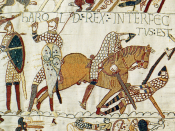William the Usurper
Every country has a unique culture. Where would America be without its hand-made quilts, fried chicken, or football? Things like these make a country a civilization and influence the inhabitants' daily lives, lives that are governed by people who also share this culture. But when power passes to leaders that do not share this culture, how can the people be expected to accept it? That is exactly what happened in the year 1066 AD when William the Conqueror used immoral and manipulative tactics to lay claim to a throne that did not rightfully belong to him.
The chain of events that lead to William's claim is a long one. It starts around the year 1051 when the influence of foreign nobles in the courts was high because King Edward himself had been raised in Normandy and had many foreign friends that were constantly visiting him at court (Teirney 196).
One such friend, Count Eustace of Boulogne, on his way home from visiting the king found himself in Wessex. The proud Frenchman expected to be given free lodging anywhere in his friend's kingdom, and approached one of the Englishmen accordingly. When he resisted, they killed him on the spot, starting a fight that ended with twenty dead Englishmen and nineteen dead Frenchmen. When Count Eustace told his story to King Edward, Edward called on the Earl of Wessex, Godwin, who was regarded by all of the patriotic Englishmen as the father of their country. King Edward, without any evidence save the word of his French friends, insisted that Godwin punish Wessex. When Godwin refused, he and his son, Harold where banished from England (History 1-2). This incident shows us that the foreign king was for all intents and purposes estranged from
his subjects in favor of his foreign...


